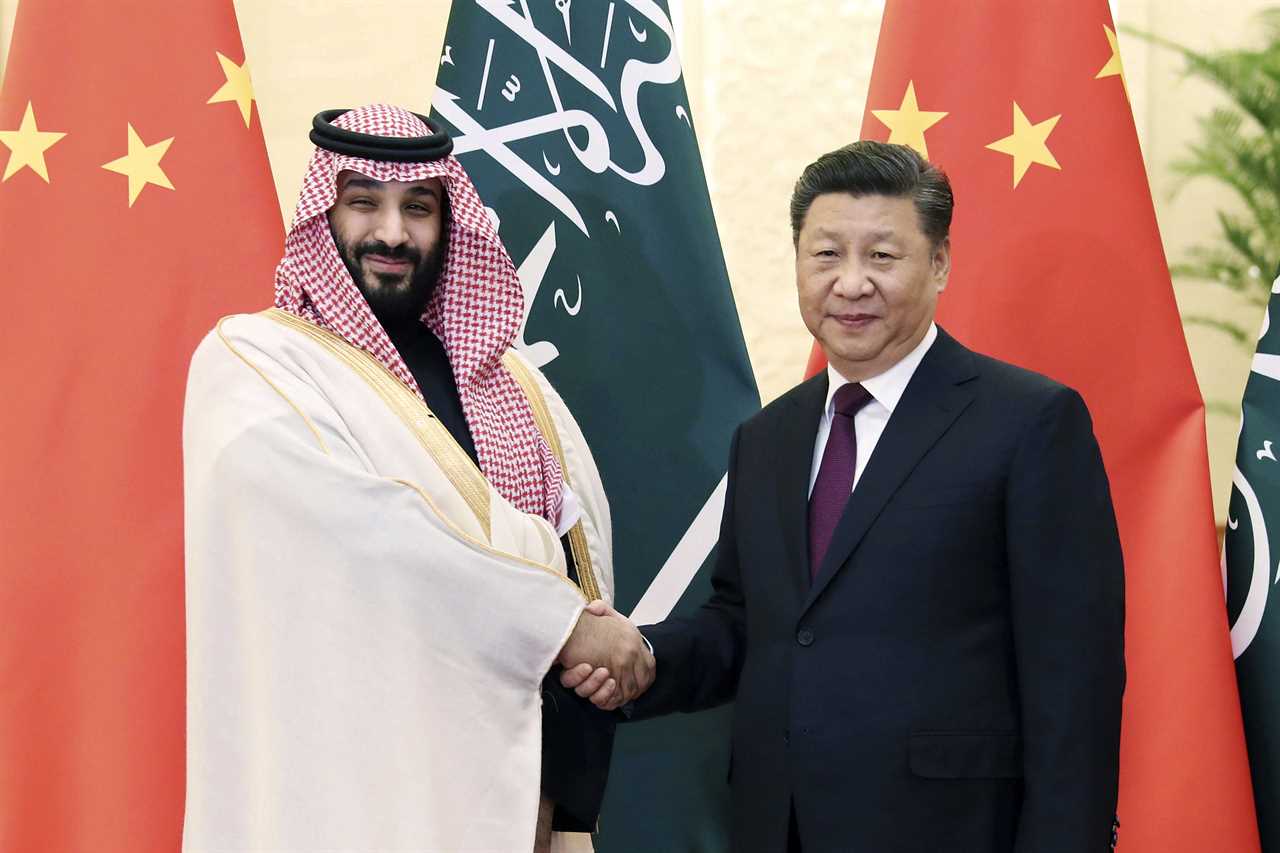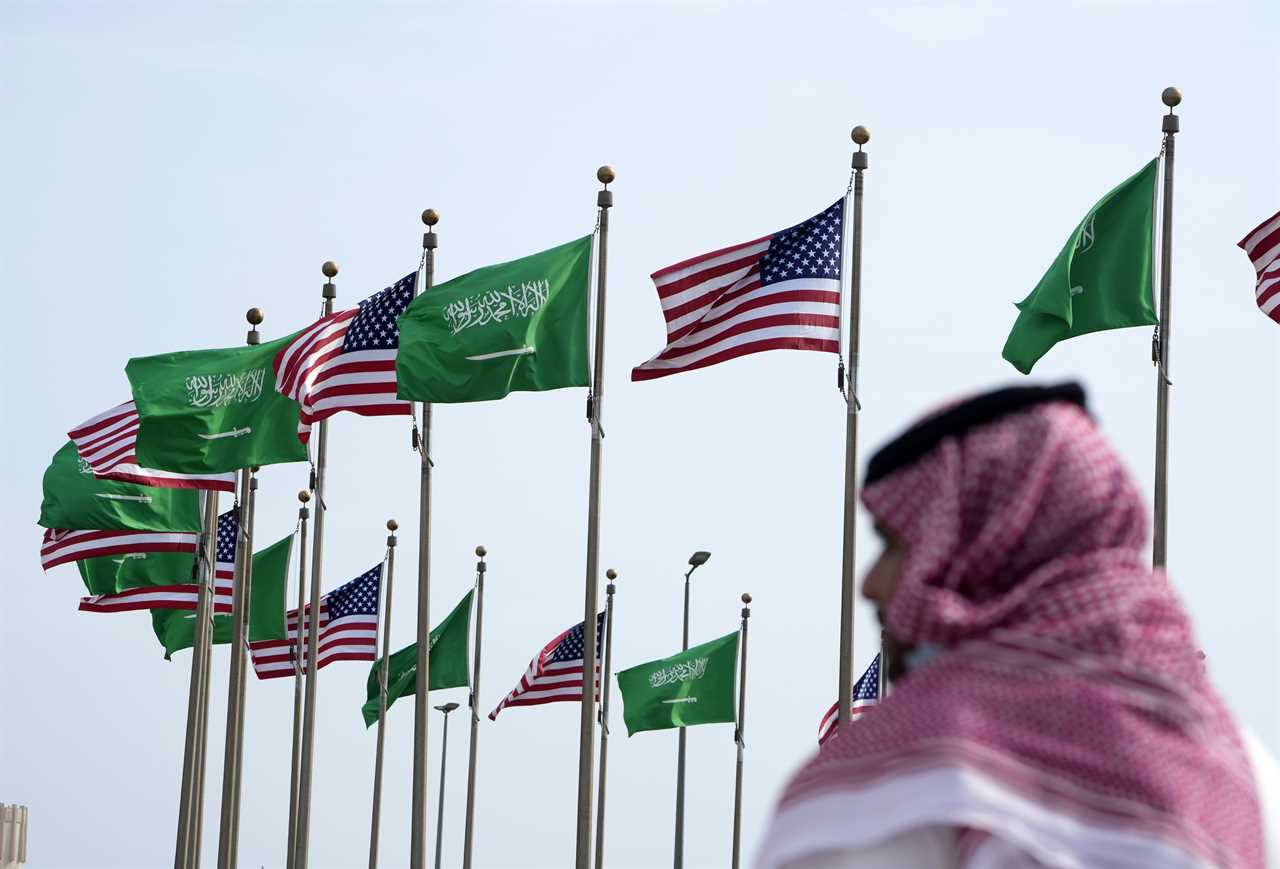
President Joe Biden will travel to Saudi Arabia on Friday to try to repair a rocky relationship that threatens to create a power vacuum.
Biden isn’t hiding his concerns about the threat China poses. Washington has been long been Riyadh’s superpower patron of choice, but Beijing is waiting in the wings.
In a Washington Post op-ed published last week, Biden argued that improving U.S.-Saudi relations was essential to positioning the U.S. “in the best possible position to outcompete China.”
Biden’s problem is that he self-sabotaged his own efforts “to reorient — but not rupture” U.S.-Saudi relations with his 2016 campaign trail rhetoric that accused the Saudis of “murdering children” in Yemen and promised to make Riyadh a "pariah" over the assassination of Washington Post columnist Jamal Khashoggi.
Those comments, along with Biden's move to revive the Obama-era Iran denuclearization pact that former President Donald Trump killed, ruffled Saudi feathers and alienated Saudi Arabia’s de facto leader, Crown Prince Mohammed bin Salman.
It also fueled doubts in Riyadh about U.S. reliability, boosting China’s efforts to position itself as a rising superpower alternative.
“The United States has been somewhat missing in action, has called [Saudi Arabia] a pariah and several administrations have said there's a need to pivot towards Asia, inferentially meaning away from the Middle East,” said Robert Jordan, former U.S. ambassador to Saudi Arabia and diplomat in residence at Southern Methodist University. “That makes it more attractive for them to turn to their largest customer as a country of considerable influence. China also has the added benefit of not lecturing the country on human rights.”
Working to Beijing’s advantage is a close economic relationship with Riyadh lubricated by China’s dependence on Saudi oil. China and Saudi Arabia sealed a “strategic partnership” in 2016 tied to “stable long-term energy cooperation.” It's payed off: bilateral trade was valued at $65.2 billion in 2020.
By comparison, U.S.-Saudi bilateral trade — dominated by Saudi oil sales and the Kingdom’s purchases of U.S.-produced automobiles and aircraft — was a meager $19.7 billion that same year.
Riyadh took the China relationship one step further this March by announcing its intent to abandon U.S. dollar transactions for some of those oil sales and switch them to China’s currency, the renminbi.
Beijing has positioned itself as a nonjudgmental partner to Riyadh and as a counterpoint to a U.S.-Saudi diplomatic chill that hit new depths after Khashoggi's 2018 murder.
Beijing enticed Saudi Arabia in 2021 into becoming a “dialogue partner” in the Shanghai Cooperation Organization, a China-initiated regional security and development grouping whose members include Kazakhstan, India, Russia, Kyrgyzstan, Tajikistan, Pakistan and Uzbekistan.
Chinese President Xi Jinping has positioned the organization as a defiant counterpoint to U.S.-dominated multilateral groupings — with their pesky commitment to democracy and rule of law — by urging SCO members to “refuse sanctimonious preaching from those who feel they have the right to lecture us.” China is also seeking to connect its Belt and Road Initiative infrastructure development program with Saudi Arabia’s domestic infrastructure construction scheme.
“The Chinese have worked for access and for influence not just in Saudi Arabia, but in the Gulf as a whole. … They survey the situation in a given country, they see where there may be points of advantage to them or access to them, and they move,” said David Satterfield, former principal deputy assistant secretary for the Bureau of Near Eastern Affairs and director of Rice University’s Baker Institute for Public Policy.
China also has a longstanding role as Saudi Arabia’s military hardware and technology supplier of last resort by providing Riyadh equipment that the U.S. refuses to sell due to concerns about sparking a regional arms race.
That relationship began with the sale of intermediate-range surface-to-surface missiles in 1988 and culminated in December with U.S. intelligence agency revelations that China had sold equipment and technology that allow Riyadh to manufacture its own ballistic missiles. A month later, China’s Defense Minister Wei Fenghe reaffirmed that cooperation by pledging that China would “maintain strategic communication with the Saudi military.”
But that doesn’t mean that China can easily wean Saudi from decades of dependence on U.S.-provided weapons systems.
“The Chinese can provide missiles and missile technology that our Congress probably still would be too anxious to provide, but the interoperability of American military platforms is so important in the relationship with Saudi Arabia that it would take five or six years to recalibrate and reorient to some kind of a Chinese wave of new military assistance,” Jordan said.
Saudi Arabia currently deploys U.S. weapon platforms that include Terminal High Air Area Defense anti-missile systems, M1A2 Abrams Main Battle Tanks and Multi Mission Surface Combatant ships.
Despite Beijing’s diplomatic inroads, its relationship with Saudi Arabia is hampered by China’s ties to Riyadh’s nemesis, Iran. Beijing’s purchases of Iranian oil provide the sanctions-choked Tehran regime an economic lifeline, and China and Iran inked a 25-year Strategic Cooperation Agreement designed to supercharge bilateral trade and cooperation. That relationship breeds suspicion in Riyadh.

“We all need to take a deep breath when it comes to Saudi-Chinese relations. Yes, they are strengthening, going beyond simple transactions of oil sales. Yes, Crown Prince Mohammed bin Salman surely appreciates not being asked by the Chinese about Jamal Khashoggi, just as the Chinese appreciate not hearing criticism about the treatment of Uyghurs from MBS,” Jeffrey Feltman, the former U.S. assistant secretary of State for Near Eastern Affairs, said in a statement. “But in the end, China is not concerned with Iran, which Saudi Arabia considers its #1 existential threat. The United States is concerned. Despite complications, the United States will remain Saudi Arabia’s essential partner, however uncomfortable that partnership often is for both sides.”
Mindful of the decades of U.S. blood and treasure squandered in Afghanistan and Iraq, China has adopted a resolutely neutral position on the multitude of regional tensions in the Middle East.
“China over the last several decades has had very balanced relationships with countries across the Middle East, whether it's Saudi or Israel, or Iran or Turkey, and I just don't see any deviation from that,” said Dawn Murphy, associate professor of national security strategy at the National War College. “They don't want to be perceived as an external power taking sides.”
China’s tip-toe regional approach is calculated to provide Beijing access to needed resources and markets without risking the potential blowback of an overt challenge to traditional U.S. dominance in the Middle East.
“China is looking to increase its own influence, undermine American influence, [and] reap strategic gains from the region, but it is deliberately trying to do all of this in ways that don't pick a fight with the United States to try to stay under Washington's radar,” said Michael Singh, former senior director for Middle East affairs at the National Security Council and managing director at the Washington Institute for Near East Policy.
Where China does make noise that appeals to the Saudi leadership is in its aggressive rejection of foreign criticism of Riyadh’s human rights record.
“China does not mind what internal policies the Saudi government takes toward the Saudi population including minority groups or dissidents,” said Tong Zhao, senior fellow in the Nuclear Policy Program at the Carnegie–Tsinghua Center for Global Policy in Beijing.
Readouts of bilateral meetings between senior officials invariably include a ritual denunciation of such criticism.
Saudi officials appear grateful to Beijing for turning a blind eye to Riyadh’s rights record — which includes what Human Rights Watch calls “routine repression” of dissidents, independent clerics and women’s rights activists as well as “systematic discrimination” against religious minorities — and regularly return the favor by parroting Chinese government responses to criticism of China’s rights record.
“[We] staunchly support China's legitimate position on such issues concerning core interests as Xinjiang, resolutely oppose any interference in China's internal affairs and firmly safeguard the rights of all countries to choose their own political and human rights paths independently,” bin Salman told Xi during a phone call in April.
Biden’s Saudi Arabia visit may succeed in draining some of the rancor from the bilateral relationship. But it is unlikely to alter Riyadh’s willingness to leverage its deepening ties with China to pressure the U.S. to make its Saudi alliance an exception to the Biden administration’s avowed foreign policy guided by “American values, including a commitment to democracy, human rights and the rule of law.”
“Like during the Cold War … Saudi Arabia tries to play great powers off against one another.” Singh said. “If you are worried that the U.S. will drive too hard a bargain, a great way to mitigate that is to engage in flirtation with Moscow and Beijing, to tell every visiting American delegation how much more reliable the Russians are as an ally, or how the Chinese are offering you cooperation in this military area which the U.S. won't like.”
----------------------------------------
By: Phelim Kine
Title: China stands in the way of Biden’s Saudi outreach
Sourced From: www.politico.com/news/2022/07/15/biden-china-saudi-us-00045722
Published Date: Fri, 15 Jul 2022 03:30:00 EST
Did you miss our previous article...
https://consumernewsnetwork.com/politics-us/meet-the-young-woman-at-the-head-of-the-house-gops-firstterm-class






